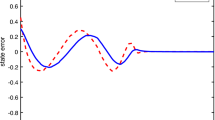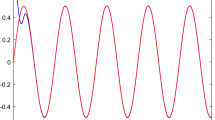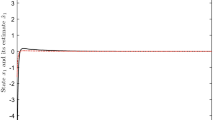Abstract
This paper investigates the problem of event-triggered H∞ state estimation for Takagi-Sugeno (T-S) fuzzy affine systems. The objective is to design an event-triggered scheme and an observer such that the resulting estimation error system is asymptotically stable with a prescribed H∞ performance and at the same time unnecessary output measurement transmission can be reduced. First, an event-triggered scheme is proposed to determine whether the sampled measurements should be transmitted or not. The output measurements, which trigger the condition, are supposed to suffer a network-induced time-varying and bounded delay before arriving at the observer. Then, by adopting the input delay method, the estimation error system can be reformulated as a piecewise delay system. Based on the piecewise Lyapunov-Krasovskii functional and the Finsler’s lemma, the event-triggered H∞ observer design method is developed. Moreover, an algorithm is proposed to co-design the observer gains and the eventtriggering parameters to guarantee that the estimation error system is asymptotically stable with a given disturbance attenuation level and the signal transmission rate is reduced as much as possible. Simulation studies are given to show the effectiveness of the proposed method.
Similar content being viewed by others
References
L. A. Zadeh. Outline of a new approach to analysis of complex systems and decision processes. IEEE Transactions on Systems, Man, and Cybernetics, 1973, SMC-3(1): 28–44.
M. Sugeno. Industrial Applications of Fuzzy Control. Amsterdam, The Netherlands: Elsevier, 1985.
T. Takagi, M. Sugeno. Fuzzy identification of systems and its application to modeling and control. IEEE Transactions on Systems, Man, and Cybernetics, 1985, SMC-15(1): 116–132.
H.-K. Lam, C. Liu, L. Wu, et al. Polynomial fuzzy-model-based control systems: stability analysis via approximated membership functions considering sector nonlinearity of control input. IEEE Transactions on Fuzzy Systems, 2015, 23(6): 2202–2214.
H.-K. Lam, B. Xiao, Y. Yu, et al. Membership-function-dependent stability analysis and control synthesis of guaranteed cost fuzzymodel- based control systems. International Journal of Fuzzy Systems, 2016, 18(4): 537–549.
S. Tong, Y. Li, S. Sui. Adaptive fuzzy output feedback control for switched nonstrict-feedback nonlinear systems with input nonlinearities. IEEE Transactions on Fuzzy Systems, 2016, 24(6): 1426–1440.
S. Tong, Y. Li, S. Sui, Adaptive fuzzy tracking control design for SISO uncertain nonstrict feedback nonlinear systems. IEEE Transactions on Fuzzy Systems, 2016, 24(6): 1441–1454.
H.-N. Wu, Z.-P. Wang. Observer-based H8 sampled-data fuzzy control for a class of nonlinear parabolic PDE systems. IEEE Transactions on Fuzzy Systems, 2018, 26(2): 454–473.
H.-N. Wu, H.-D. Wang, L. Guo. Disturbance rejection fuzzy control for nonlinear parabolic PDE systems via multiple observers. IEEE Transactions on Fuzzy Systems, 2016, 24(6): 1334–1348.
M. Wang, J. Qiu, G. Feng. Finite frequency memory output feedback controller design for T-S fuzzy dynamical systems. IEEE Transactions on Fuzzy Systems, 2018, 26(6): 3301–3313.
M. Wang, J. Qiu, M. Chadli, et al. A switched system approach to exponential stabilization of sampled-data T-S fuzzy systems with packet dropouts. IEEE Transactions on Cybernetics, 2016, 46(12): 3145–3156.
S. G. Cao, N. W. Pees, G. Feng. Analysis and design for a class of complex control systems–Part II: Fuzzy controller design. Automatica, 1997, 33(6): 1029–1039.
G. Feng. Analysis and Synthesis of Fuzzy Control Systems–A Model Based Approach. Boca Raton: CRC, 2010.
H. D. Tuan, P. Apkarian, T. Narikiyo, et al. Parameterized linear matrix inequality techniques in fuzzy control system design. IEEE Transactions on Fuzzy Systems, 2001, 9(2): 324–332.
J. P. Hespanda, P. Naghshtabrizi, Y. Xu. A survey of recent results in networked control systems. Proceedings of the IEEE, 2007, 95(1): 138–162.
J. Qiu, H. Gao, S. X. Ding. Recent advances on fuzzy-model-based nonlinear networked control systems: A survey. IEEE Transactions on Industrial Electronics, 2015, 63(2): 1207–1217.
M. Wang, M. Wang, J. Qiu, et al. Robust exponential stabilization for sampled-data systems with variable sampling and packet dropouts. Circuits Systems, and Signal Processing, 2016, 35(10): 3482–3505.
M. Wang, M. Wang, S. Fu, et al. New results on H∞ filter design for sampled-data systems with packet dropouts and transmission delays. IET Signal Processing, 2017, 11(4): 477–485.
R. A. Gupta, M.-Y. Chow. Networked control system: Overview and research trends. IEEE Transactions on Industrial Electronics, 2010, 57(7): 2527–2535.
Y. Shi, J. Huang, B. Yu. Robust tracking control of networked control systems: Application to a networked DC motor. IEEE Transactions on Industrial Electronics, 2013, 60(12): 5864–5874.
P. Tabuada. Event-triggered real-time scheduling of stabilizing control tasks. IEEE Transactions on Automatic Control, 2007, 52(9): 1680–1685.
J. Lunze, D. Lehmann. A state-feedback approach to event-based control. Automatica, 2010, 46(1): 211–215.
M. C. F. Donkers, W. P. M. H. Heemels. Output-based eventtriggered control with guaranteed L∞-gain and improved and decentralized event-triggering. IEEE Transactions on Automatic Control, 2012, 57(6): 1362–1376.
W. P. M. H. Heemels, M. C. F. Donkers, A. R. Teel. Periodic event-triggered control for linear systems. IEEE Transactions on Automatic Control, 2013, 58(4): 847–861.
C. Zhang, J. Hu, J. Qiu, et al. Reliable output feedback control for T-S fuzzy systems with decentralized event triggering communication and actuator failures. IEEE Transactions on Cybernetics, 2017, 47(9): 2592–2602.
H. Li, Z. Chen, L. Wu, et al. Event-triggered control for nonlinear systems under unreliable communication links. IEEE Transactions on Fuzzy Systems, 2017, 25(4): 813–824.
H. Yan, T. Wang, H. Zhang, et al. Event-triggered H8 control for uncertain networked T-S fuzzy systems with time delay. Neurocomputing, 2015, 157: 273–279.
S. Wen, T. Huang, X. Yu, et al. Aperiodic sampled-data slidingmode control of fuzzy systems with communication delays via the event-triggered method. IEEE Transactions on Fuzzy Systems, 2016, 24(5): 1048–1057.
W. Hu, L. Liu, G. Feng. Consensus of linear multi-agent systems by distributed event-triggered strategy. IEEE Transactions on Cybernetics, 2016, 46(1): 148–157.
W. Hu, L. Liu, G. Feng. Output consensus of heterogeneous linear multi-agent systems by distributed event-triggered/self-triggered strategy. IEEE Transactions on Cybernetics, 2017, 47(8): 1914–1924.
W. Hu, L. Liu. Cooperative output regulation of heterogeneous linear multi-agent systems by event-triggered control. IEEE Transactions on Cybernetics, 2017, 47(1): 105–116.
Y. Fan, L. Liu, G. Feng, et al. Self-triggered consensus for multi-agent systems with zeno-free riggers. IEEE Transactions on Automatica Control, 2015, 60(10): 2779–2784.
W. Hu, L. Liu, G. Feng. Cooperative output regulation of linear multi-agent systems by intermittent communication: A unified ramework of time- and event-triggering strategies. IEEE Transactions on Automatica Control, 2018, 63(2): 548–555.
C. Zhang, J. Hu, J. Qiu, et al. Event-triggered nonsynchronized H8 filtering for discrete-time T-S fuzzy systems based on piecewise Lyapunov functions. IEEE Transactions on Systems, Man, and Cybernetics: Systems, 2017, 47(8): 2330–2341.
H. Wang, P. Shi, J. Zhang. Event-triggered fuzzy filtering for a class of nonlinear networked control systems. Signal Processing, 2015, 113: 159–168.
D. Zhang, P. Shi, Q.-G. Wang, et al. Distributed non-fragile filtering for T-S fuzzy systems with event-based communications. Fuzzy Sets and Systems, 2017, 306: 137–152.
J. Liu, Q. Liu, J. Cao, et al. Adaptive event-triggered H8 filtering for T-S fuzzy system with time delay. Neurocomputing, 2016, 189: 86–94.
J. Liu, S. Fei, E. Tian, et al. Co-design of event generator and filtering for a class of T-S fuzzy systems with stochastic sensor faults. Fuzzy Sets and Systems, 2015, 273: 124–140.
C. Fantuzzi, R. Rovatti. On the approximation capabilities of the homogeneous Takagi-Sugeno model. Proceedings of the 5th IEEE International Conference on Fuzzy Systems, New Orleans: IEEE, 1996: 1067–1072.
X.-M. Zhang, Q.-H. Han. Event-based H8 filtering for sampleddata systems. Automatica, 2015, 51: 55–69.
X.-M. Zhang, Q.-H. Han. A decentralized event-triggered dissipative control scheme for systems with multiple sensors to sample the system outputs. IEEE Transactions on Cybernetics, 2016, 46(12): 2745–2757.
S. K. Nguang, W. Assawinchaichote. H∞ filtering for fuzzy dynamical systems with D stability constraints. IEEE Transactions on Circuits and Systems I: Fundamental Theory and Applications, 2003, 50(11): 1503–1508.
M. Wang, J. Qiu, G. Feng. Finite frequency filtering design for uncertain discrete-time systems using past output measurements. IEEE Transactions on Circuits and Systems I: Regular Papers, 2018, 65(9): 3005–3013.
S. Boyd, L. El Ghaoui, F. Feron, et al. Linear Matrix Inequality in Systems and Control Theory. Philadelphia: SIAM, 1994.
Author information
Authors and Affiliations
Corresponding author
Additional information
This work was supported in part by the Research Grants Council of the Hong Kong Special Administrative Region of China (No. CityU-11211818), the Self-Planned Task of State Key Laboratory of Robotics and Systems of Harbin Institute of Technology (No. SKLRS201801A03) and the National Natural Science Foundation of China (No. 61873311).
Meng WANG received the B.Eng. degree in Automation from Northeastern University at Qinhuangdao, Qinhuangdao, China, in 2011, and the M.Eng. degree in Control Science and Engineering from the Harbin Institute of Technology, Harbin, China, in 2013. He is currently pursuing the Ph.D. degree in Mechanical and Biomedical Engineering from the City University of Hong Kong, Kowloon, Hong Kong. His research interests include robust control and filtering, fuzzy systems and control, and their engineering applications.
Jianbin QIU received the B.Eng. and Ph.D. degrees in Mechanical and Electrical Engineering from the University of Science and Technology of China (USTC), Hefei, China, in 2004 and 2009, respectively. He also received the Ph.D. degree in Mechatronics Engineering from the City University of Hong Kong, Kowloon, Hong Kong in 2009. He has been with the School of Astronautics, Harbin Institute of Technology since 2009, where is currently a Full Professor. His current research interests include intelligent and hybrid control systems, signal processing, and robotics. Prof. Qiu is a Senior Member of IEEE and serves as the chairman of the IEEE Industrial Electronics Society Harbin Chapter, China. He is an Associate Editor of IEEE Transactions on Cybernetics.
Gang FENG received the Ph.D. degree in Electrical Engineering from the University of Melbourne, Australia. He has been with City University of Hong Kong since 2000 after serving as lecturer/senior lecturer at School of Electrical Engineering, University of New South Wales, Australia, 1992–1999. He is now Chair Professor of Mechatronic Engineering. He has been awarded an Alexander von Humboldt Fellowship, the IEEE Transactions on Fuzzy Systems Outstanding Paper Award, and Changjiang chair professorship from Education Ministry of China. He is listed as a SCI highly cited researcher by Clarivate Analytics. His current research interests include multi-agent systems and control, intelligent systems and control, and networked systems and control. Prof. Feng is an IEEE Fellow, an associate editor of Journal of Systems Science and Complexity, and was an associate editor of IEEE Transactions on Automatic Control, IEEE Transactions on Fuzzy Systems, IEEE Transactions on Systems, Man & Cybernetics–Part C, Mechatronics, and Journal of Control Theory and Applications.
Rights and permissions
About this article
Cite this article
Wang, M., Qiu, J. & Feng, G. Event-triggered state estimation for T-S fuzzy affine systems based on piecewise Lyapunov-Krasovskii functionals. Control Theory Technol. 17, 99–111 (2019). https://doi.org/10.1007/s11768-019-8189-3
Received:
Revised:
Accepted:
Published:
Issue Date:
DOI: https://doi.org/10.1007/s11768-019-8189-3




